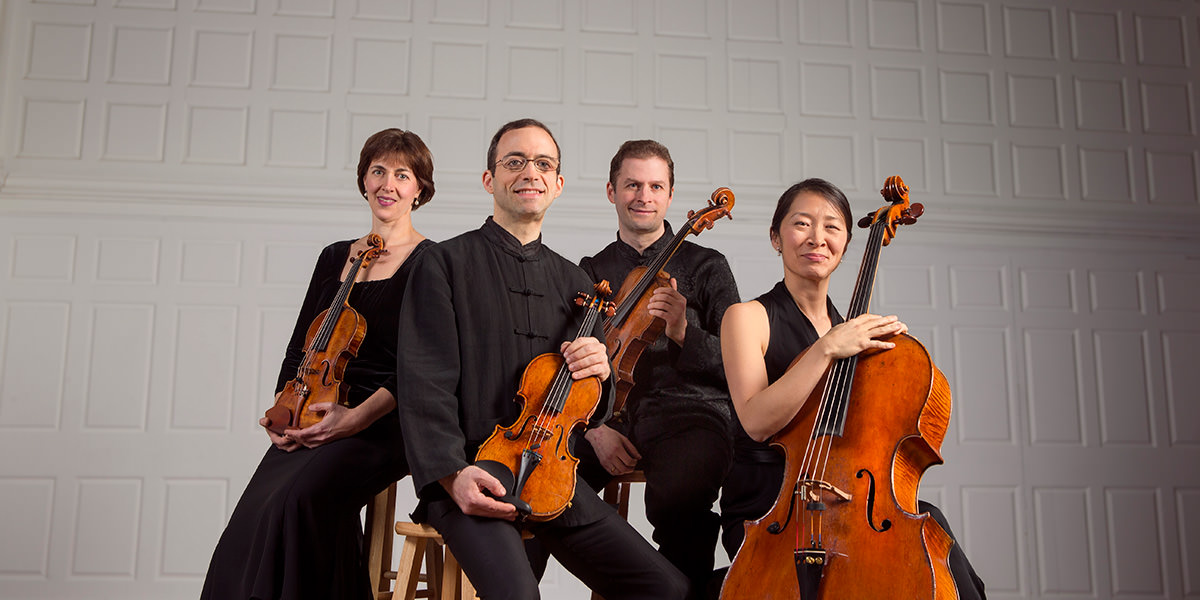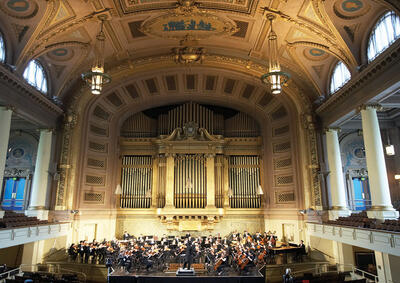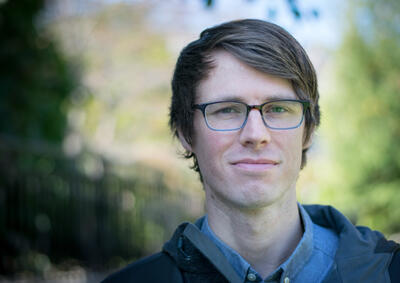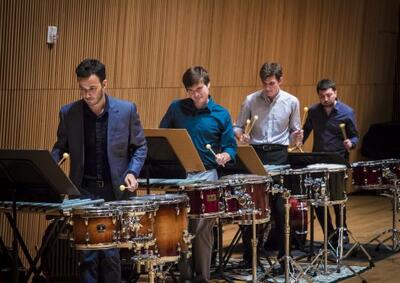Brentano String Quartet to perform program of "Lamentations"
Commenting on a concert program called "Lamentations," Brentano String Quartet violinist Mark Steinberg explained, "There exists an old tradition of professional lamenters, who, as a service to those who grieve, digest and transfigure that grief in giving it voice," asking, "What greater faith in art can be imagined?" The program, Steinberg said, "celebrates that art of cathartic expression in songs of lamentation from Purcell through Bartók and Carter, evincing strength and vulnerability in equal measure, through the intimacy and immediacy of the string quartet."
The Brentano String Quartet, YSM's outstanding ensemble-in-residence, will perform its "Lamentations" program at Yale on Tuesday, Jan. 29. We spoke recently with the group's violist, Misha Amory, about the program.
Q: What are the origins of this program? How did you and your colleagues conceive “Lamentations” and choose the repertoire?
A: This project is a brainchild of Mark's and has two origins behind it. One is the idea that music of mourning or lamentation is everywhere in our canon, composed and expressed in all periods and in all styles, and Mark felt it would be interesting to gather up examples of this into a single program so that we can appreciate how a diverse body of music can spring from a single, universal urge. The other idea propelling the project is perhaps more of a practical one, which is that each of these little pieces, taken on its own, is awkward to fit into a conventional string quartet program, which typically consists of three or four substantial works in several movements. In that type of program, smaller works might end up marginalized or lost in the bigger picture. This program enables us to perform these beloved pieces in a setting where their power is not dimmed, but rather thrown into relief.
Q: What other works of art, if any—literature, visual art, etc.—have you considered as you’ve developed this program?
A: We have not referred to works of art or literature that are not directly connected to the pieces on the program. That said, almost every piece on the program has some point of reference beyond "pure music." The Haydn ["Eli, Eli” from the Seven Last Words of Christ] of course is music depicting the spirit of Christ's final utterances, meant to provide time for meditation during the Good Friday service; Lekeu's Molto Adagio is similarly religiously themed. [Purcell's] Dido's Lament connects us to Virgil's Aeneid, an epic poem of antiquity, and more nearly to the world of Baroque opera, intertwining the sensibilities of two artistic periods pre-dating the string quartet. Shostakovich's Elegy is his own transcription for string quartet of the extraordinary aria from his opera Lady Macbeth of Mtsensk: like the Purcell, it displays the grief of a solitary and unloved one, and like the Purcell it is from an opera based on a great literary work of the past. The Gesualdo madrigals have their own poetic texts (of course not heard in a quartet performance), and madrigal form is the most literary of music, with every note and turn of phrase intimately connected to and entwined with its text. All in all, this program has deep ties to many primary strands in Western culture.
Q: Mark has asked, rhetorically, “What greater faith in art can be imagined?” What has music meant for you during times of grief and what is it about music that it can reach us so deeply?
A: This question needs a whole book to answer! I believe, personally, that the power of music in this sense is somehow connected to its non-verbal nature. Nobody can escape the experience of grief, and yet it will come to each person differently. Likewise, virtually no one is unaffected by music, but each listener will hear his own version. Music does not explicitly state its meaning in performance, leaving the listener to construe it according to her own lights. Sometimes music can be consoling, sometimes unbearable to one who is grieving; either way, it unquestionably penetrates deep into the psyche.
Q: What have conversations between you and your colleagues been like as you’ve rehearsed this repertoire? In what ways have you explored the composers’ motivations and intentions?
A: Mark once told me a story about being coached by Fritz Maag, a great cellist and musical thinker who was on the faculty at Indiana University. Mark was in a student group that was playing the grief-stricken opening of the finale of Beethoven's Op. 95, a devastating passage of just a few bars. Mr. Maag memorably said, "As human beings, I hope you never have to experience the suffering contained in this music ... but as artists, you have to be able to imagine it." This is about as good a set of marching orders as there is for a musician aspiring to meaningful expression. We are always method actors of a sort, trying not just to understand the composer's intention, but to crawl into his mind, to become him, or the person he is depicting. Of course it is part of every performer's job to be well-grounded in the biographical and stylistic details of the composer he is performing, and I believe that this knowledge casts a kind of penumbra that deepens the performance and gives it resonance. However, the chief part of our labor consists in engaging with the piece itself, at a molecular level: pondering the expressive aspects of a subphrase, meditating on the contours and textures of a single work by a single person, identifying what makes it unique by dwelling within it as a primary source. In fact, to spend too much time examining external considerations (for example, events in the composer's life in the year of the composition) can have an oddly distracting, or diluting, effect on our work. We do best when we scrutinize the composer's motivations and intentions as seen in the music that is on the page, before our eyes.
Q: Does this repertoire require a unique performance headspace? To what extent is each of you experiencing catharsis through playing this music and is that something you’ve discussed?
A: This program of lamentations is certainly concentrated on a special theme, a special state of mind. At the same time, the fabric of Western music is shot through with threads of grief and mourning—it is a powerful and ever-present trait in the music we play, and I can't think of an important work that doesn't contain at least moments of sorrow. So it would be fair to say that the feeling of playing music of this sort is almost second nature to us. I expect that an audience member might be surprised if he could enter into our thoughts as performers during a program, how they might seem dry and practical in comparison to the music itself. This is the double nature of being a performer, to take care of the laundry list of details while never losing sight of the transcendental nature of the art that confronts us. Having said that, we find that the audiences that have heard this program do indeed enter into a "unique headspace," which is very much what we hope for. Taken as a body of work, the pieces on the program slow down time; they invite a meditative state and ask for the listener's compassion as she contemplates these manifold expressions of grief and loss expressed from so many different times and places. The catharsis will take place, it is hoped, in the minds of those who are listening.
The Brentano String Quartet will perform its "Lamentations" program on Tuesday, Jan. 29, at 7:30 p.m., in Morse Recital Hall.






